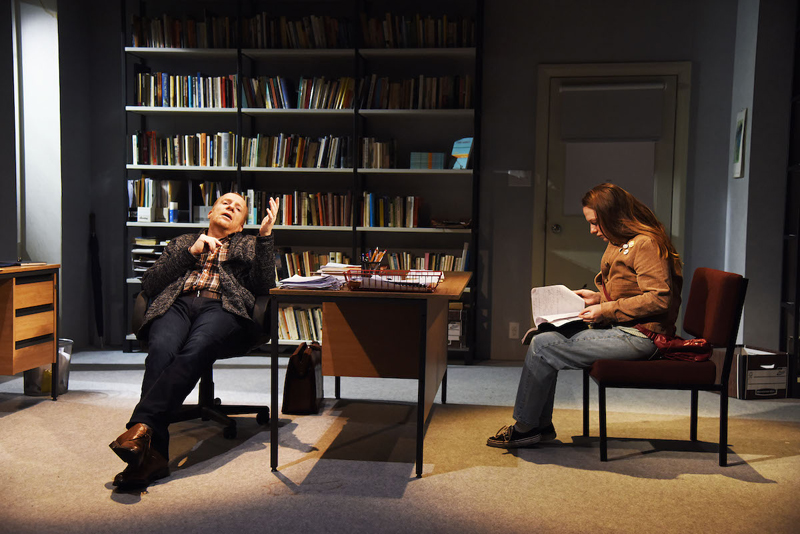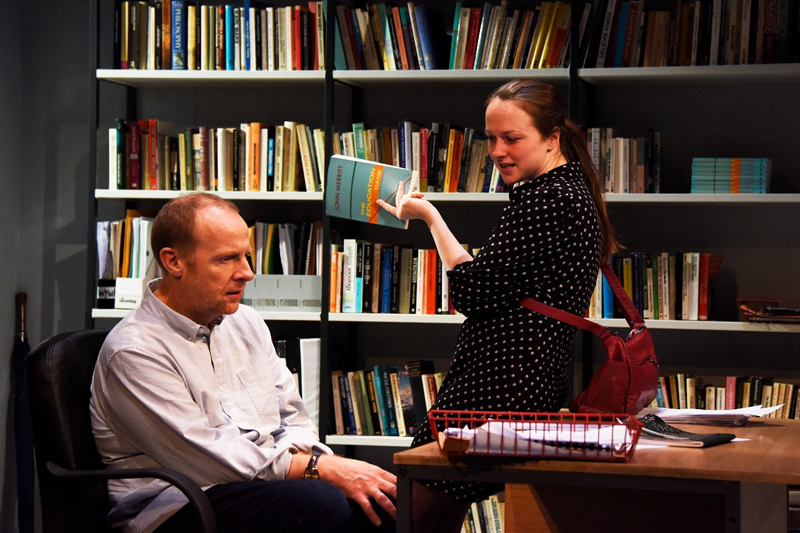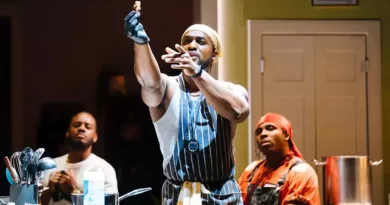“Oleanna”: Arts Theatre
Jay Paul Skelton in the West End
13 December 2020
In the nineteenth century, the Norwegian violinist Ole Bull attempted to establish a utopian community called Oleana in the northern part of Pennsylvania only to see his dreams meet the harsh reality of soil that simply couldn’t sustain anything that was planted. David Mamet, in his 1992 play Oleanna, revived by Theatre Royal Bath in 2020 in a production impeccably directed by Lucy Bailey happily transferred to the West End, suggests that society’s hopes for finding some measure of harmony are as doomed as Bull‘s erstwhile efforts.

Jonathan Slinger and Rosie Sheehy. Photo credit: Nobby Clark.
Mamet wrote Oleanna at a time that featured a number of scandals, including the Anita Hill-Clarence Thomas hearings in which Thomas, a candidate for the Supreme Court in the US, was accused of sexual harassment by Hill, his former employee. The proceedings devolved into “he said, she said”, and Thomas was found neither guilty nor innocent of the charges levelled against him. He became a justice in 1991, and within years Hill’s ordeal inspired new legislation surrounding sexual harassment and a wave of female candidates to run for office. I was startled -–and saddened – on the opening night of this production at how the text retains its timeliness in light of #MeToo, the searing testimony of Christine Blasey Ford during the nomination of Brett Kavanaugh to the Supreme Court in 2018, and revelations of systemic sexism and racism in universities here in the UK over the past year or so.
The play focuses on the fraught relationship between John, a university professor on the verge of achieving tenure, and Carol, a struggling student who turns to John for clarity on his class lectures. It’s a common situation, at least in my own experience in higher education as both student and lecturer, but the circumstances are almost immediately revealed as a means for Mamet to explore issues related to power and its abuse, especially in regard to gender dynamics. Although John is sympathetic to Carol’s questions, he’s also a smug, middle-aged man and uses his position in ways that — arguably — dissolve the boundary of an otherwise straightforward tutorial session.
On the other hand, Carol is a young woman clearly struggling with the curriculum but — arguably — focused too much on getting things right than truly understanding the material. I use the term “arguably” twice here because Mamet above all invites argument, challenging our sympathies as words and actions are misconstrued or deliberately re-contextualized by both parties. The result is that our perceptions of John and Carol shift in the blink of an eye throughout the play; who is right or who is wrong as Carol accuses John of sexual harassment is often reflected in the identity of the individual audience member. I remember seeing a production of the play in Chicago in 1993 when I was a graduate student and found myself rooting for Carol in the face of John’s intellectual smarm. I’m now a middle-aged university lecturer and — surprise! — heard Carol’s incessant use of the phrase “I don’t understand” to mean in no uncertain terms: “I won’t understand”. It’s a testament to Mamet’s skill with language that both responses are right.

Jonathan Slinger and Rosie Sheehy. Photo credit: Nobby Clark
Oleanna is one of the last times in his career that Mamet tried to explore some level of objectivity in his plays. He became more politically conservative at the turn of the new century, and his later output seems to bait the audience in such works as November, Race, and The Anarchist. The appearance of even-handedness in Oleanna remains as the play continues, though I might argue — oh, that word again! — Mamet betrays his sympathies in both structure and content. John is given centre-stage from the start of the performance, offering what could be considered an act-long monologue as he balances a series of urgent phone calls with answers to Carol’s questions about her most recent paper and the content of his module. lt doesn’t help that, as John, Jonathan
Slinger (a veteran of the Royal Shakespeare Company) found every nuance in Mamet’s text and folded them into a full-blooded portrait of a man in existential crisis. Carol is often referred to as the most three-dimensional female character in Mamet’s otherwise male-dominated oeuvre, but she remains a cypher that can often reveal the playwright’s interest in keeping the argument going rather than offering logical character progression. ln the first act, she repeatedly asks John to define his concepts about education using plainer language that she can understand, but in later scenes she inexplicably employs complex terms to explain her newly politicised position. Rosie Sheehy, recently seen in the title role of King John at the RSC, did wonders with what might be considered the more schematic role of this two-hander, suggesting hidden depths that aren’t immediately apparent from the text. She’s riveting.
The technical aspects of the production were simple yet top-notch. The setting by Alex Eales was a picture of university building banality, though I have to admit the space is larger than any professor’s office I’ve ever experienced. The lighting was suitably stark, suggesting overhead fluorescents on the verge of needing replacement. However, designer Oliver Fenwick subtly helped focus the action as it moved from deskbound tutorial to intimate discussion. Eales also made some key costume decisions that helped us see Carol’s transition from subjugated student to empowered woman. The only production element I found curious was the sound design by Jon Nicholls. The breaks between scenes were accompanied by what sounded to me like a dial tone, though I admit it was difficult to hear through the murmuring of the audience as they debated the latest twist in the play. It conceptually hearkened back to the constant interruptions John experiences throughout, but one particular break was long enough that the tone became just plain annoying. It was — no pun intended — the one sour note in a production that sent us out into the evening trying to parse whether Carol or John was right to do what they each did.
I hope Mamet is wrong in his contention in Oleanna that we are doomed as a people to never find common truths between us. Or that higher education is at its heart a game set up to indoctrinate unwitting students. Or that we exercise power primarily as a means to exact revenge on each other. However, such is the immediacy of this production of Oleanna that I was happy to enter into the argument with him. I think I’m still arguing about it, truth be told. Well played, Mr Mamet. Well played.









